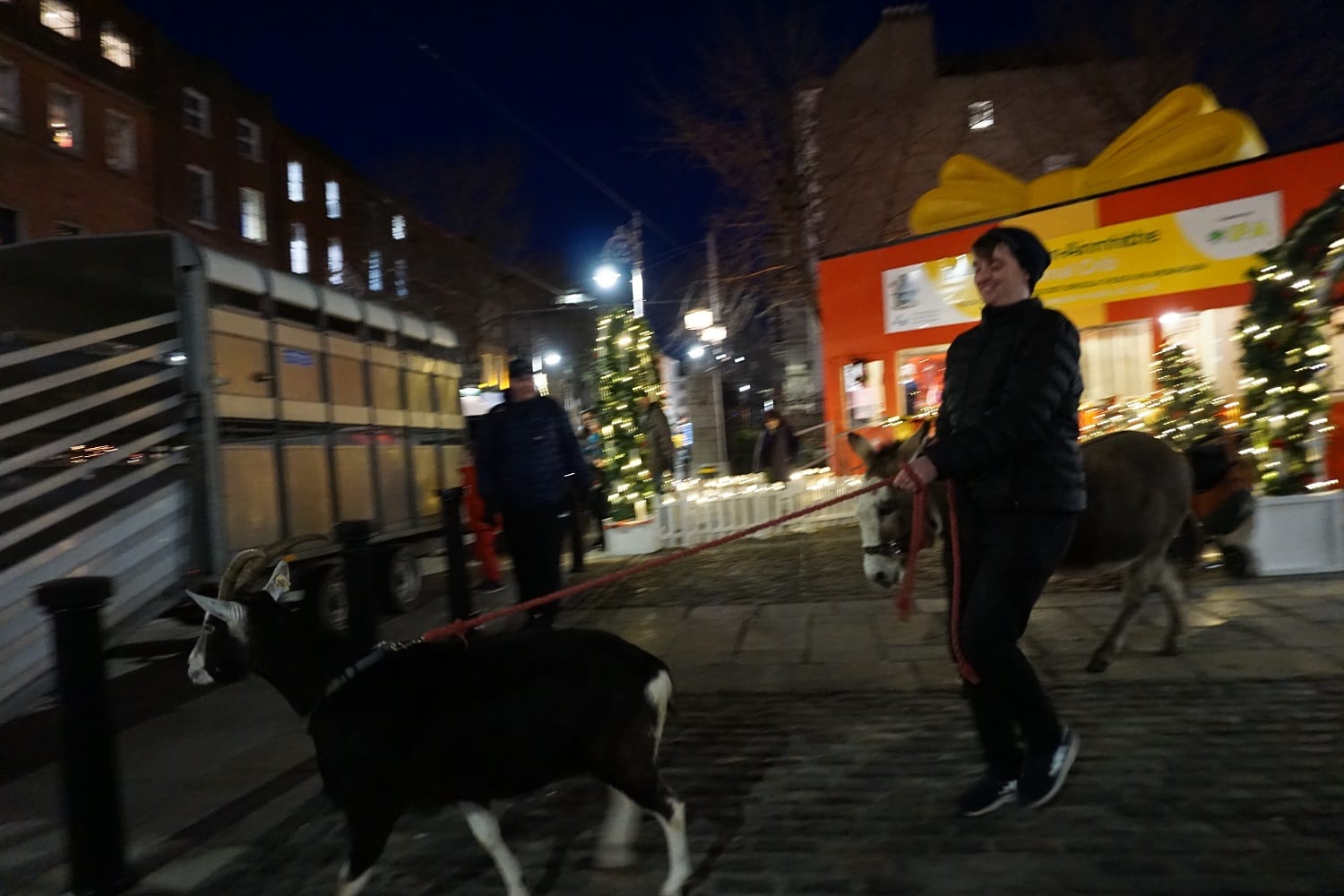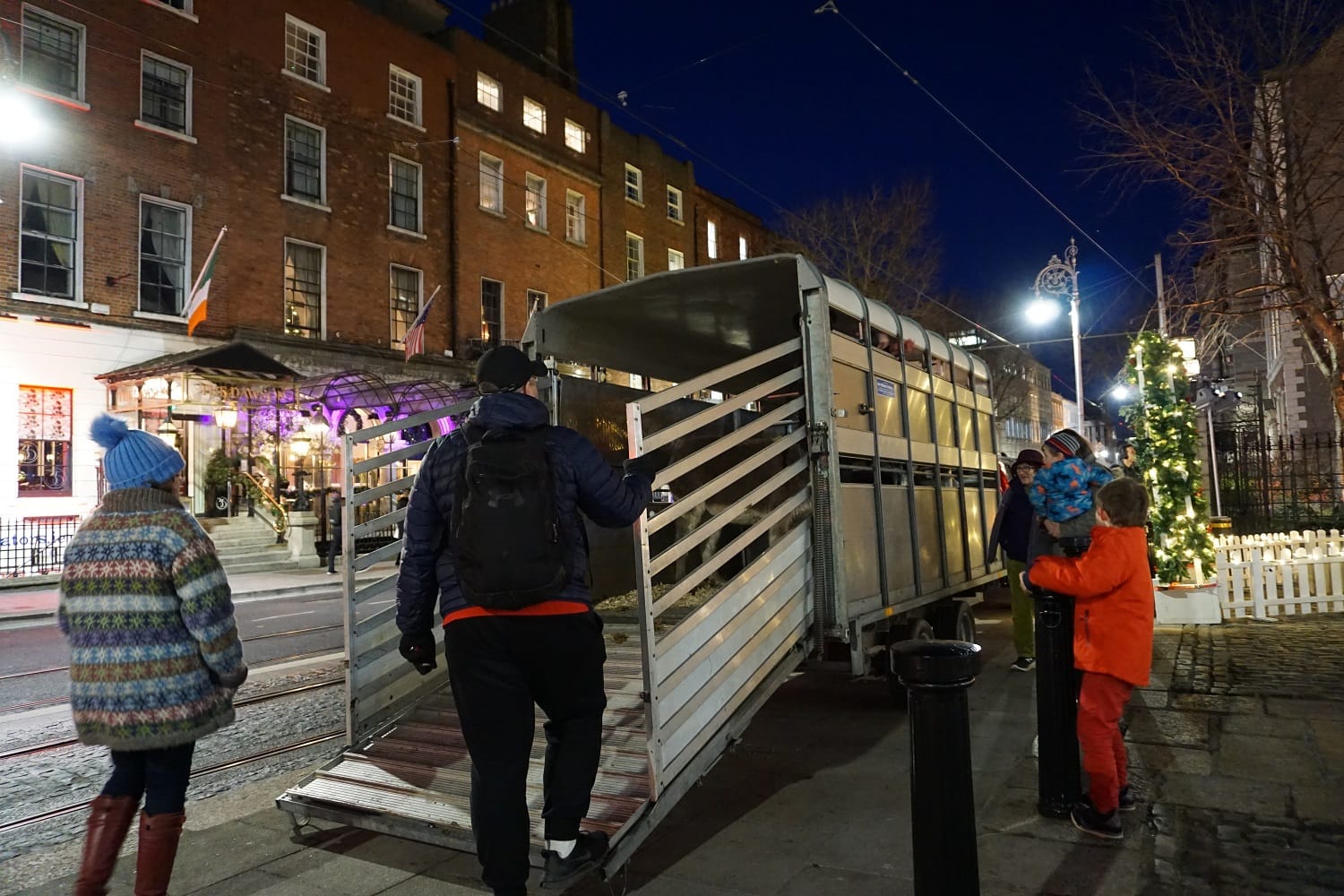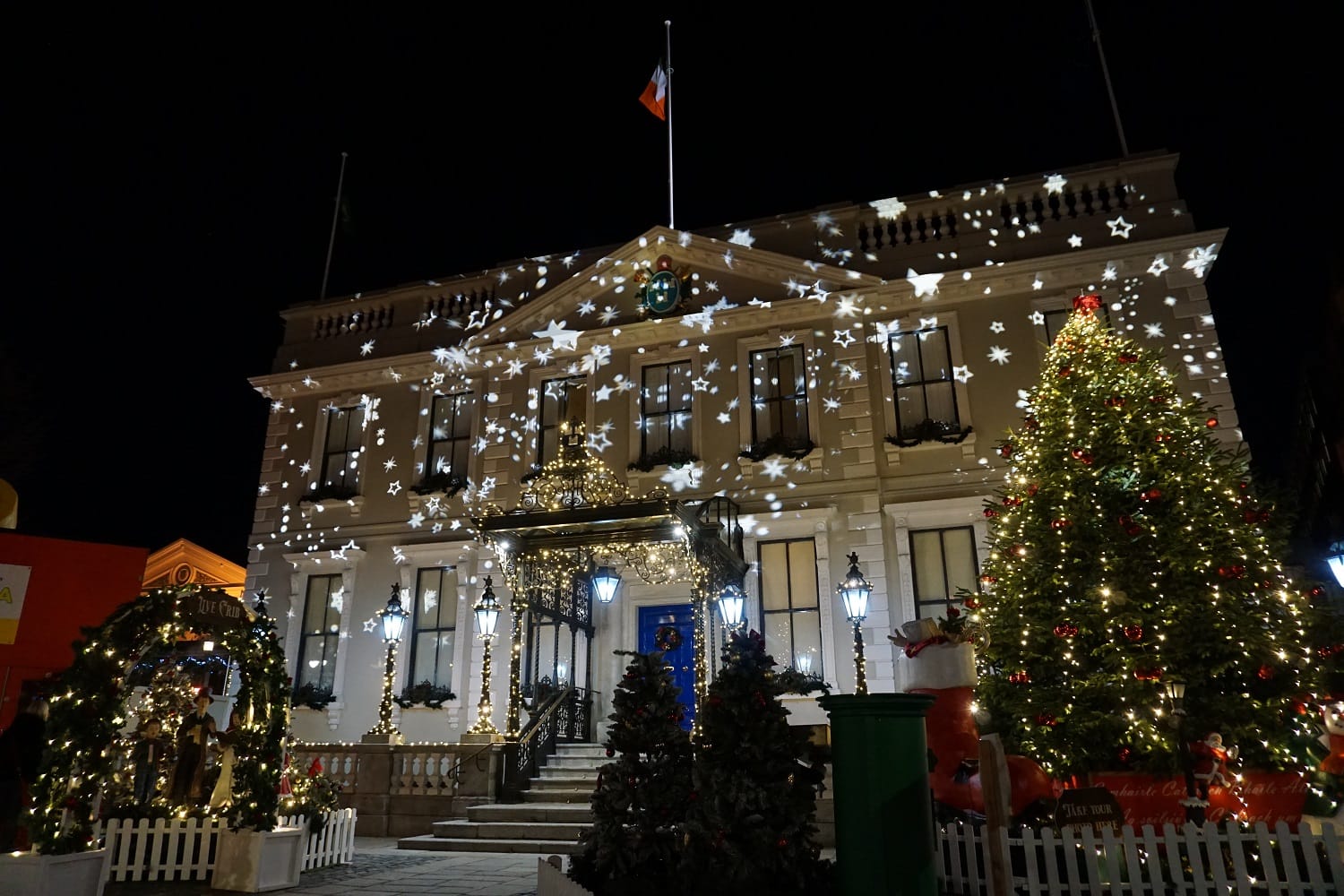Things To Do: Walk the M50, attempt to understand Jean-Luc Godard, be crowned King of the Birds
Our latest recommendations, and community noticeboard listings.
For more than 30 years, members of one family have shepherded animals from their small farm in Enniskerry to Dublin’s city centre.

Every day in the weeks running up to Christmas, from 11am to 5pm, Fionn Sherlock sits in a small, windowless room at the back of a shed on Dawson Street.
On a recent Monday afternoon, he’s bundled up in a puffer jacket and knit cap, and there are a couple of heaters on. He has a laptop and a few books laid out on a table. It’s the middle of his shift, and it’s about six degrees outside.
Sometimes, he says, he forgets what day of the week it is. Because every day is the same routine.
“But it’s something I really enjoy doing. I’ve been doing it for a number of years now, and, hopefully, maybe, for the next while.”
For more than 30 years, members of Sherlock’s family have shepherded animals to the Mansion House, from their small farm in Enniskerry, County Wicklow, to take part in the city’s live animal crib.
“It’s a big part of Christmas every year,” Sherlock says, “and it’s part of the Dublin tradition”.
There are two doors in Sherlock’s little room. One opens out onto Dawson Street. A towering nutcracker king stands outside it.
Occasionally, an old teacher or classmate will come and knock.
“I did it through school, so a lot of my teachers know I’ll be here,” he says. “That’s really nice. You always see people because Dublin’s a small place.”
The other door leads to the stables, where the donkey, goat, and two sheep are kept.
It used to be Sherlock’s grandfather, Johnny Gallagher, who brought the animals in every day. When Sherlock was about 10, he started going with him.
“I got to learn from the ground up. The whole process,” he says.
Now 23, Sherlock minds the animals on his own. This year, he’s studying for his “unfortunate” early January exams in property economics at TU Dublin.
“I take breaks and come out and around. I listen out for any problems. I can hear everything that’s going on.” It’s better than a library, he says.
“For children in Dublin, it’s great,” Sherlock says. “Some kids are mesmerised by the animals.”
Inside the crib, Peter and Paul, the sheep, are snuggled together on a bed of straw. One of them looks bored, and chews hay with his eyes half closed. The other one chews with his eyes completely shut.
They don’t seem bothered by the children and their families stopping by to take a look.
The sheep are different every year, because they’re always small and young. Peter and Paul were born in the spring, Sherlock says.
Between the two stables is a low fence, where Bobbi the donkey pokes her head into the sheep section to see what’s going on. Beside her is Lily the goat.
Bobbi and Lily are regulars at the live crib – they’ve been doing it together for the last few years.
They’ve grown attached to each other, Sherlock says. “If I took, say, the goat away and didn’t bring the goat in tomorrow, the donkey would be very upset. She likes to have someone with her.”
Every morning, when it’s time to make the trek to Dublin, the two have to board the trailer together. “The goat and donkey are buddies, I would say.”
Next to the animals, there’s a manger scene made up of statues behind a glass window.
A woman holds a little boy in a red-and-green elf hat up to see it. He asks where Jesus is. The woman says he’s not there yet.
The boy stands next to the manger, telling everyone who passes that Jesus isn’t in there yet.
“Donkey,” says another little boy, standing in front of the goat.
“The other part of the donkey is in here,” his dad says, motioning to Bobbi’s back end, which is behind the goat.
“Goat,” says the boy.
“Oh, and what’s in here? The other crib is in here, the one with the statues. This one’s Mary…” The dad lifts the little boy up to see the scene.
“Door,” says the boy.
“That’s the door out to the back where they put all the poo.”
That’s not entirely true.

Sherlock and one of his parents bring the animals in every morning, before the crib officially opens at 11am.
“Before the animals go in every morning, we always like to get here a bit early, before everything starts,” Sherlock says.
That’s when they clean out the stables and put down fresh straw and hay. They bag up the old straw, and any manure, and bring it home, Sherlock says.
“It’s all clean. We don’t want any smell for people.”
They put out fresh water and hay.
“Then the sheep get some nuts – it’s like having some muesli for them in the mornings, just an extra bit of stuff for them. Then the donkey gets some carrots. They’re well fed. Then they go in,” Sherlock says.
“There’s always someone here, no matter what, to look after the animals. In case something happens or if someone has a query or wants to ask questions.”
Sherlock’s grandfather Johnny, now 80, can’t drive anymore. He was over for dinner recently and asked how it was going.
“It was a big part of his Christmas. He used to love bringing the animals around … If he was driving, he’d be in here, 100 percent,” Sherlock says. “It’s a big part of the family.”
“My twin sister was in here over the weekend because I was doing stuff at home with the cattle … The whole family gets involved. It’s a busy time of year.”
Outside the crib, there are trees, white picket fences, and a post box with a sign that says, “Post a letter to Santa.” There’s a red chair – Santa’s throne – with silver reindeer leaping behind it.
People mill about, snapping photos.
The crib is organised by Dublin City Council and the Irish Farmers’ Association.
It’s free to see the animals, but volunteers in red vests stand outside collecting donations for the Mansion House Fuel Fund, the lord mayor’s charity.
Originally set up in 1891, the fund used to help the needy during the cold months. Now, proceeds from the crib go to local charities.
Today the volunteers are from Abbey Presbyterian Church on Parnell Square, and they’re doing one-hour shifts.
Sandra Poynton is one of them, and she’s been volunteering for the last 10 years or so.
Her husband Robert, who died earlier this year, used to organise a lot of the congregation’s community service, starting with a Christmas-hamper initiative he got involved with in 1974, the year they got married.
“I’m happy to do it. As far as weather’s concerned, I’m a bit less enthusiastic if it’s bucketing rain,” Poynton says. “You just gear yourself up for it. In general, people are very good-hearted.”

By 5pm, Sherlock’s mother, Jackie Gallagher, is parked outside with a jeep and trailer, to bring the animals, and her son, home for the evening.
“They just go into the stable, and they have hay and straw there. They just kind of take it handy until the next morning,” says Sherlock.
He comes out of his makeshift library and walks around to open the trailer. He brings Peter and Paul, the sheep, over on red leads.
A few people stop on the footpath to watch. Nearby, a toddler with light-up runners sprints around near Santa’s throne.
Next, Sherlock walks Lily and Bobbi over, also on leads.
At about 10 minutes past five, the jeep pulls onto Dawson Street, and the crib is closed for the night. But everything is still lit up, and the snowflakes projected onto the Mansion House float in ellipses.
The Sherlock/Gallagher family are set to do this every day until Christmas Eve – that’s a half day, when the crib is open from 11am to 1pm.
“The animals have to be brought home, and everything has to be cleaned out. Everyone’s winding down. I have to get home myself and get ready for Christmas,” Sherlock says.
